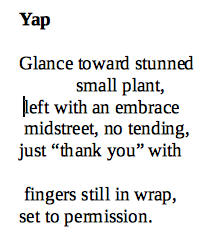obviously can’t blog or link to those two poems, but I will be in Tears in the Fence soon, I assume the next edition.
Month: June 2022
Tattered by Magnets
144 poems, divided into 12 parts, each composed of 3 unrhymed tercets with unusual spacing within each line. The blurb says it was originally written to be read, which I’m guessing would be uncompromising, but I cannot find a recording.
I am half way through. What is being said, as well as what is incoherent, seems a matter of judgment, as nothing is entirely straight forward unless you read each block of text in a line as a single unit that does not combine with the others. Nothing seems to be going on exactly, but I have the faint sense Tim Allen is on holiday somewhere exotic and surrounded by people he hates.
The “ideogram” is mentioned in passing; I would consider every poem an ideogram, generated with surrealism shaped into a consistently soft song of rough units (incorporating all content softly into itself), about his own evil. Quite why Tim Allen is evil, I’m unsure about.
This only became clear by the third chapter (2:12 ends “curios”).
At first I thought that each spaced phrase was naming something, even with single words like ‘in’ or ‘and’, but there are also directions. I then suspected it was formed around the tension between a confession – one which draws you in – and the construction of a personality – due to fragmentation: “I’ve heard those lies before”. On those terms, there is a sense of a lament about his world: “Capitalism exists only behind the eyes”.
I then got stuck asking how anyone engages with language. I guess you just make your connections then get parodied: “the quiet mind is as bouyant as a plucky little craft escaping trees [2:3]”
It was only when I was happy with the world he was constructing that it appeared to be shaped around himself, his fleeting thoughts about himself – who is asking you to look – in different settings, and how that comes off as quite sad: “the turtle looks fed up”.
There is less humour than in the last book of his I blogged about (“snotty dawn” made me laugh), but I probably prefer this Tim Allen.
The last word is ‘diamonds’. Are they “forever” or “a girl’s best friend’? If there is a lightness here it is not gratuitous, but at the axis of low and high culture; make of that whatever.
Grandiloquent Wretches
A4 chapbook which bases itself loosely on the Welsh metrical tradition. I know absolutely nothing about that, but the footnotes to the poems astonish me with the luminosity they grant the reference.
For me – and for sure I don’t speak for anyone else – the collection lacks joy, so that their, very taut, meanings can appear too heavy or too light depending on how you read, and I cannot reasonably connect the poems together.
But the collection has a genuine worth.
Waking from sleep paralysis
I was trying a new approach to editing/shaping some of my recent poems, one based on visualising size (comprehension?) as impossible, a sort of folding up of affect/emotion into something of the same extent. OK, so the link to ‘egotistical sublime’ is prima facie fairly weak, but I need to find a means to move beyond the improvisation/generative technique I have learnt, to order its non-music. At this point, I am looking for poems that do – while expressing content, just as the improvisations expressed an idea – the above, perhaps via deconstruction. Quite how to do that, I’m unsure, if only because “deconstruction is not a method” (I assume this means it is a goal).

Does ‘waking from sleep paralysis’ deconstruct or just reverse a ‘false awakening’? I don’t suppose it matters at all, but if you want to take it literally – not just radically oppose two phrases – you have reversed nothing: a dramatic escape from sleeping does not mean we never failed to wake up – anymore than we will not dream again – but displaces dreaming with the world, allows us to think again their difference. If it seems otherwise, maybe that’s due to urgency to negation, not thinking through contradictions but forgetting one side, the dream, which we could begin to work with.
I suppose you could see both as a form of distraction. Anyway, this method (I would not go so far as to call it a “poetic”, which denotes more the network of ideas which make up its usefulness etc.) may have helped me focus intuitively on the form to ‘free verse’, opened that up a bit, so I am not forming sounds or words etc., but meaning. Whether or not they are any good depends I suppose on your poetic.
For me, they may work due to being difficult to successfully read aloud.
Creative writing classes
I’ve sat a few, with mixed results. It was interesting to work with poets and find out how they engage with students. However, I have a theory that all they’re prepping you for, in poetry, in the main, is some kind of sensuous realism. So as it’s as if you were actually there as the protagonist leans into the screen and kisses his newest selfie.
Who knows.